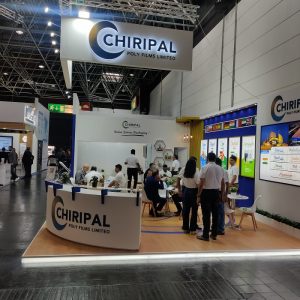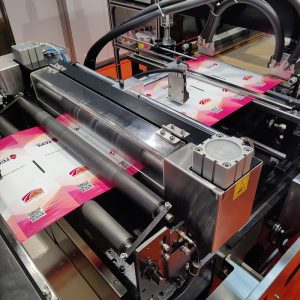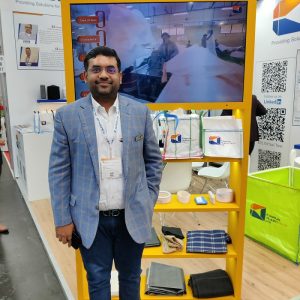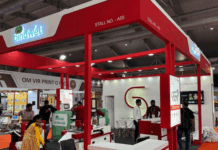India had a formidable presence at this year’s Interpack, one of the world’s leading packaging expos. Despite visa issues, akin to K 2022 in Dusseldorf, Indian exhibitors displayed great enthusiasm as the expo was returning after a six-year gap. In fact, the number of Indian exhibitors this year increased to around 120, up from 98 in 2017.
At the show, Packaging South Asia had the opportunity to meet with quite a few Indian companies, including manufacturers of flexible packaging, labels, film, flexible intermediate bulk container (FIBC) or jumbo bags, adhesives as well as machine builders and converters. A prominent theme emerged during the conversations – the growing confidence among Indian companies in expanding their presence in the international markets.
This confidence stems from multiple factors. First, the Indian economy and exports have shown resilience during global uncertainties and slowdowns. Second, the Indian government is working on boosting manufacturing and positioning India as an integral part of the global supply chain – a sort of viable alternative to China. Plus, the presence of a number of Indian first-timers at Interpack 2023 reinforces the notion that Indian companies are increasingly looking beyond the domestic market.
Flexible and label converters and film manufacturers
Among the participants were flexible packaging converters and film manufacturers. Ahmedabad-based Vishal Containers, which had participated in Pack Expo International and Pack Expo Las Vegas in the US, made its debut at Interpack. Having established itself in the US market, the company aims to make a mark in Europe. Vishal Containers showcased its premium flexible packaging solutions and promoted its recyclable range called Circupack, manufactured using advanced green technologies, at Interpack.
This was the second Interpack for Mumbai-based Mudrika Labels, a label printer and converter. The company exhibited samples of a variety of labels – pressure-sensitive, heat transfer, and in-mold. While Mudrika Labels already supplies its products to overseas customers, it aims to capitalize on the ‘China plus One’ trend by expanding its global customer base.
“In the last couple of years, there has been a ‘China plus One’ theme where global companies want to diversify their sourcing away from China. India is emerging as an attractive manufacturing destination. We want to capitalize on this opportunity by offering quality products and services and acquiring more global clients. And that is why platforms such as Interpack are important,” said Manish Desai, one of the directors of Mudrika Labels.

Chiripal Poly Films promoted its BOPP, BOPET, and CPP films range at the expo. It also showcased its sustainable and specialty products. The company, which earlier this year formally inaugurated its mega factory in Hyderabad, looks to build its global client base by offering customized solutions.
Brilliant Polymers, a leading manufacturer of laminating adhesives for flexible packaging, made its debut at Interpack. The company has experienced significant export growth in recent years, catering to Africa, the Middle East, Southeast Asia, and the Indian subcontinent. Despite its focus on the Indian and emerging markets, Brilliant Polymers aims for aggressive growth in developed markets as well.
“Because of this growth in exports, we thought it would be a good idea to come to Interpack, which is one of the world’s biggest trade shows for the packaging and processing industry. We see exports as a growth driver for the company,” said Gaurav Talwar, managing director, Brilliant Polymers.
Machine manufacturers
While converters and film manufacturers constituted a significant part of the Indian contingent at Interpack, noteworthy machine manufacturers were also present. Mumbai-based Stelda showcased the AR 500 GT, an all-random case packaging system, and utilized the event as an opportunity to meet visitors from countries where its group company, Bindwel, has a strong presence. Though still small, Stelda is trying to make a mark in the Indian and global markets with its end-of-the-line packaging machines.

Galaxy Packtech, a fast-growing company based in Greater Noida, presented its pouch-making machines at Interpack, marking its debut at the event. The company announced a deal to sell its GS-24 Plus 200 automatic stand-up pouch-making machine to Maropack GmbH, a packaging solutions provider based in Germany. This deal signifies Galaxy Packtech’s progress in the global market, aligning with its goal of boosting exports.
Indian flexible intermediate bulk container industry
The Indian flexible intermediate bulk container (FIBC) industry has been a remarkable success story, particularly in the US and European markets. According to Shashank Agarwal, the president of the Indian Flexible Intermediate Bulk Container Association (IFIBCA), India holds a significant market share in these regions. India has a 75% share in European imports of FIBC and a 72% share in the US import market.
FIBCs are used for bulk transportation and storage of items such as food, milk powder, chocolate powder, agro products, chemicals, PVC, polymers, and building materials, among others.
Agarwal attributes India’s dominance in the FIBC export market to factors such as a focus on quality, excellent engineering capabilities, backward integration, and ethical business practices. The IFIBCA has played a vital role in the industry’s development, contributing to its success, he said.

At Interpack, approximately 20 Indian FIBC manufacturers participated as exhibitors and visitors, according to Agarwal, who is also the deputy managing director of Kanpur Plastipack, a leading FIBC manufacturer.
Agarwal says India will continue to dominate the global FIBC market. After establishing a stronghold in the US and European markets, Indian FIBC manufacturers are now aiming to expand their presence in Japan and South Korea, he said.











